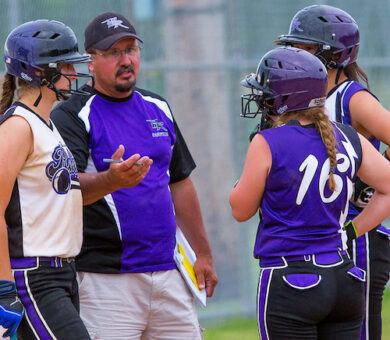Tips to Help You Become an Advocate During the Recruiting Process
Many high school coaches want to be more involved as their student athletes go through the recruiting process. However, the process is very confusing, and clear information is hard to obtain. My experience talking with many high school coaches is that they are lost when it comes to the recruiting process. Some feel there is not enough genuine, clear or helpful information for them or their student athletes.
The recruiting process is very confusing. The recruiting rules, from all the different governing associations, change often, and it’s hard to keep up with all of those changes. That makes it hard to know how best to help your student athletes.
Here are some tips to help coaches become more helpful to their student athletes as they navigate the recruiting process.
Show You Care
The first thing to do is demonstrate that you truly care about your athlete’s process and would like to assist in the recruiting process. In a recent Find My Team poll, we found that student athletes lean on their high school coaches and parents first when it comes to tackling the recruiting process. You are an important person in this process.
Many high school athletes need their coaches, not only to talk to about their recruiting process, but also to help them communicate with college coaches. Most high school athletes and their parents will not know how to begin the process. You can help by just being there as they travel through this journey.

Learn the Process
In order to help your student athletes, you have to understand the process yourself. This takes some initiative and work, but it is very doable. First, use sites like Find My Team to learn as much as you can.
College athletic rules, timelines and paperwork vary depending on the athletic association. Understanding the differences is like memorizing the Constitution. It is important to know where to go to find information.
The Find My Team staff and website are resources that will help you. Additionally, each level of collegiate sports has a website that details information about their institutions.
At a minimum, these sites help you understand the different levels of college sports and the extensive number of colleges that present potential opportunities for your student athletes.
Below is a list of the collegiate associations that set the rules for their particular levels.
- NCAA – National Collegiate Athletic Association – Governs college activity in NCAA Divisions I, II and III.
- NAIA – National Association of Intercollegiate Athletics – Governs college activity in NAIA colleges.
- NJCAA – National Junior College Athletic Association – Governs college activity in junior colleges.
- NCCAA – National Christian College Athletic Association – Governs Christian college activities.

Communicate Often
Frequent communication is so important when it comes to the recruiting process. Find out what each student athlete needs to make the college choice a good fit. A good fit means that your student athlete has found a place that truly matches her needs, values, and desires and offers her a path to success after college.
Student athletes, their parents and coaches often look only at athletic programs as the criteria for choosing a college. There are so many other factors, besides athletics, that make or break college experiences for student athletes. You can help her and her parents broaden the scope of their search.
Each individual has different priorities in choosing a sports program and a college. Help the student athlete identify the important priorities for her, not just the athletic ones. As a result, the athlete will make a more informed choice on a college to attend.
For example, one athlete may want to play for a program that is already winning while another may want to help build a program, or one athlete may want a large college campus while another wants a smaller one. These are very different characteristics that could determine fit in a program. Understanding these differences makes it easier to research the factors that will help an athlete find the college that best suits her needs.
Communication from start to finish will allow the process to run more smoothly. It may be the coach who has to initiate this communication and keep the signals clear.
Help Them Understand Level of Play
At which college level can the student athlete realistically compete at, given the current skill set? Knowing this is important to find colleges where she will be able to compete. This boils down to three tasks:
- Assess the player’s level of play.
- Communicate about level of play with the student athlete.
- Communicate with the parents about level of play.
All three of these goals can be challenging. However, the first could be the easiest. You may already know her level or how to assess it.
The second and third tasks could be more difficult. Communicating to a student athlete and/or her parents about her level of play could be met with defensiveness, blame or anger. It is important to help the athlete become realistic about where she would be happiest in a college sports program.
Being honest with student athletes about their level of play helps them get a realistic view of what lies ahead in their recruiting process. It also helps them narrow their college list.
Let your athlete know that level of play does not have to be a directive but just a prediction. It can always change, especially if the student athlete truly wants to change it and there is enough time to do so.

Stay With Them
Throughout the recruiting process, there will be lots of uncertainty, ups and downs, moments of frustration as well as small victories. Knowing this ahead of time helps everyone understand that this process is anything but smooth; therefore, it is important to not get too high or too low throughout the journey. Here are some things to expect:
- When there is uncertainty, your athlete will need clarification with your help.
- When there is frustration, your athlete will need to lean on you for encouragement.
- When there are ups and downs, your athlete will need you to be the steady one who keeps everything in perspective.
- When there are small victories, your athlete will need you to recognize and celebrate those with her.
Encourage your athlete to stick with it, and remind her that you are walking with her and her family. Let them know you will assist the student athlete in landing at a college where he or she feels the right fit.
Keep It Positive
There are lots of ways the recruiting process could turn negative. College coaches may change their minds about an athlete or decide they need athletes who play different positions and roles on a team. College coaches may not always call you or the athlete back. The rules won’t always be clear. Your athlete may get injured. Colleges will come in and out of the picture, and the ones the athlete hoped for may not show up. There will be lots of shifts in the process.
The best advice is just to keep the process fun and positive. Have fun with your athletes while you navigate the process with them. Not every student has the opportunity to play in college. Fewer than two percent of high school student athletes actually go on to play college sports. Try to make it a fun process.
Most importantly, know that you play a major role and can make a difference in her experience navigating the recruiting process and enjoying her high school career.


